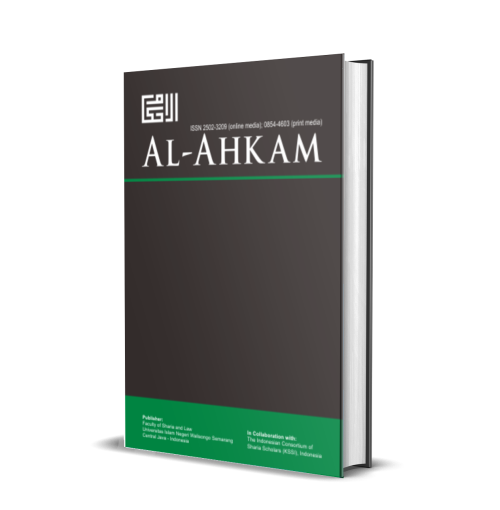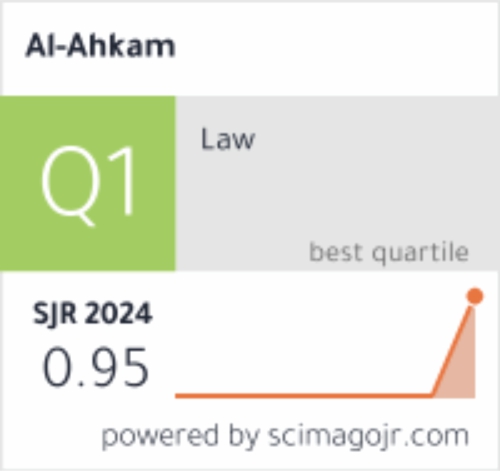Childfree in Islamic Law Perspective of Nahdlatul Ulama
DOI:
https://doi.org/10.21580/ahkam.2023.33.1.14576Keywords:
childfree, istinbāṭ al-aḥkām, Nahdlatul Ulama, qawlī, manhajīAbstract
Childfree is a social phenomenon that is becoming an interesting discussion today. It deserves the attention of Islamic law. Nahdlatul Ulama (NU), through the NU Bahtsul Masail Institute (LBM-NU), has issued four fatwas synonymous with the childfree phenomenon. This article aims to analyze the childfree phenomenon from the perspective of the istinbāṭ al-aḥkām method used by NU and its relevance to the four fatwas. This article is qualitative research using a normative Islamic law approach, which examines NU’s legal decisions regarding the denial of childbirth. These decisions are then analyzed to determine the meaning and method of istinbāṭ used. This article finds two things. First, the istinbāṭ al-aḥkām method used by LBM-NU is the qawlī intiqādī method. Second, from the aspect of its application, childfree can be equated in law with decisions that have been determined by LBMNU regarding child refusal, as long as the method adopted is legal. However, from the aspect of substance, where childfree is used as a principle and lifestyle, it requires a new fatwā decision, especially with the manhajī approach.
Downloads
References
al-Bājurī, Burhān al-Dīn Abū Isḥāq Ibrāhīm ibn Muḥammad ibn Aḥmad. Ḥāshiyah al-Bājūrī. Mesir: Īsā Bāb al-Halabī, 1992.
al-Bayhaqī, Aḥmad ibn Ḥusayn ibn ‘Alī ibn Mūsā Abū Bakr. Sunan al-Bayhaqī al-Kubrā. Makkah: Maktabah Dār al-Baz, 1994.
al-Bujayramī, Sulaymān. Ḥāshiyah al-Bujayramī ‘alā al-Khaṭīb. Beirut: Dār al-Fikr, 1981.
Bā ‘Alawī, ‘Abdurraḥmān ibn Muḥammad. Ghāyah al-Talkhīṣ fī Fatāwā Ibn Ziyād. Beirut: Dār al-Fikr, n.d.
Cambridge Dictionary. “Child-Free,” n.d.
al-Dimyaṭī, Sayyid Bakr ibn Sayyid Muḥammad Shatā. I’ānah al-Ṭālibīn. Beirut: Dār al-Kutub al-Islāmi, 2009.
Dahlan, Moh., Zakiyuddin Baidlawy, and Sugiono Sugiono. “Gus Dur’s Ijtihād Paradigm of Contemporary Fiqh in Indonesia.” Al-Ahkam 29, no. 2 (November 2019): 167. https://doi.org/10.21580/ahkam.2019.29.2.4193.
al-Farisi, Salman. “Childfree dalam Perspektif Fiqh al-Aulawiyyat.” Maqasid: Jurnal Studi Hukum Islam 10, no. 2 (2021): 1–9. https://doi.org/10.30651/mqsd.v10i2.16059.
Fadhilah, Eva. “Childfree dalam Perspektif Islam.” Al-Mawarid: Jurnal Syari’ah & Hukum 3, no. 2 (2022): 71–80. https://doi.org/10.20885/mawarid.vol3.iss2.art1.
Hanif, Muhammad, and Pitoyo Marbun. “Mengenal Konsep Child-Free: Menikah Tapi Tak Ingin Punya Anak.” Gooddoctor.co.id, June 2022. https://www.gooddoctor.co.id/hidup-sehat/info-sehat/mengenal-konsep-child-free-menikah-tapi-tak-ingin-punya-anak/.
Houseknecht, Sharon K. “Voluntary Childlessness in the 1980s.” Marriage & Family Review 5, no. 2 (n.d.): 51–69. https://doi.org/10.1300/J002v05n02_04.
Indah, Dania Nalisa, and Syaifuddin Zuhdi. “The Childfree Phenomenon in the Perspective of Human Rights and Maqashid al-Shari’ah.” Proceedings of the International Conference on Community Empowerment and Engagement (ICCEE 2021) 661, no. Iccee 2021 (2022): 222–31. https://doi.org/10.2991/assehr.k.220501.025.
Irawan, I., & Nasrullah, N. “Argumentasi Keluarga Berencana dalam Hukum Islam (Studi Fatwa Syaikh Mahmud Syaltut).” Jurnal Jawi 3, no. 2 (2020): 178–203. https://doi.org/10.24042/jw.v3i2.8078.
al-Jāwī, Muḥammad Ibn ‘Umar Nawawi. Mirqāh Ṣu’ūd al-Taṣdīq Sharḥ Sulam Tawfīq. Surabaya: Maktabah al-Hidayah, n.d.
al-Khasht, Muḥammad. Fiqh al-Nisā’ fī Ḍaw’ al-Madhāhib al-Arba’ah wa al-Ijtihādāt al-Fiqhiyyah al-Mu’āṣirah. Kairo: Dār al-Kitāb al-’Arabī, 1994.
Mahsun. Mazhab NU Mazhab Kritis. Depok: Nadi Pustaka, 2015.
Martinez, Joyce C. Abma and Gladys M. “Childlessness among Older Women in the United States: Trends and Profiles.” Journal of Marriage and Family 68, no. 4 (2006): 1045–56. https://doi.org/10.1111/j.1741-3737.2006.00312.x.
Misno, Sutisna dan Abdurrahman. Metodologi Penelitian Hukum Islam Berbasis Metode Ushul Fiqh. Bogor: UIKA PRESS, 2019.
Moore, Julia. “Reconsidering Childfreedom: A Feminist Exploration of Discursive Identity Construction in Childfree LiveJournal Communities.” Women’s Studies in Communication 37, no. 2 (2014): 159–80. https://doi.org/10.1080/07491409.2014.909375.
Muhajir, Afifuddin. Metodologi Kajian Fiqh: Pendekatan Bermadzhab Qauli dan Manhaji. Situbondo: Ibrahimy Press, 2009.
Muhammad Khatibul Umam, and Nano Romadlon Auliya Akbar. “Childfree Pasca Pernikahan: Keadilan Hak-Hak Reproduksi Perempuan Perspektif Masdar Farid Mas’udi dan al-Ghazali.” Al-Manhaj: Journal of Indonesian Islamic Family Law 3, no. 2 (2021): 157–72. https://doi.org/10.19105/al-manhaj.v3i2.5325.
Muntaha, Ahmad. “Hukum Asal Childfree dalam Kajian Fiqih Islam.” Islam.nu.or.id, August 2021. https://islam.nu.or.id/nikah-keluarga/hukum-asal-childfree-dalam-kajian-fiqih-islam-CuWgp .
Nasution, Adelina. “Narsisme Ulama: Dilema dan Posibilitas Rekonstruksi Ushul Fiqh di Indonesia.” Al-Ahkam: Jurnal Pemikiran Hukum Islam 28, no. 2 (2018): 219–44. https://doi.org/10.21580/ahkam.2018.28.2.2308.
Nawawi Thabrani. Metode Penelitian Fiqh dan Ekonomi Syari’ah. Malang: Madani Media, 2019.
Nelini, Christian Agrillo & Cristian. “Childfree By Choice: A Review.” Journal of Cultural Geography 25, no. 3 (2008): 347–63. https://doi.org/10.1080/08873630802476292.
Nurjanah, Rahmatsyah, Ali Mutakin. “Fatwa Lajnah Bahtsul Masail NU Concerning Istibdāl Wakaf and their Relevance with Renewal of Islamic Law.” Al-Istinbath: Jurnal Hukum Islam 7, no. 2 (2022): 523–46. https://doi.org/10.29240/jhi.v7i2.3707.
Nurjanah, Siti, and Iffatin Nur. “Childfree: Between the Sacredness of Religion, Law and the Reality of Society.” Al-’Adalah 19, no. 1 (2022): 1–28. https://doi.org/10.24042/al-’adalah.v19i1.11962.
Pawloeski, A. “7 Reasons why People Choose to Be Childfree.” Today.com, August 2016. https://www.today.com/health/i-don-t-think-me-7-reasons-why-people-choose-t102160.
Pralat, Robert. “Sexual Identities and Reproductive Orientations: Coming Out as Wanting (or Not Wanting) to Have Children.” Sexualities 24, no. 1–2 (2021): 276–94. https://doi.org/10.1177/1363460720926967.
al-Ramlī, Shihāb al-Dīn Aḥmad ibn Aḥmad Ibn Hamzah. Nihāyah al-Muḥtāj ilā Sharḥ al-Minhāj. Beirut: Dār al-Fikr, n.d.
Rindu Fajar Islamy, Mohammad, Kokom Siti Komariah, Dina Mayadiana Suwarma, and Adila Hafidzani Nur Fitria. “Fenomena Childfree di Era Modern: Studi Fenomenologis Generasi Z serta Pandangan Islam terhadap Childfree di Indonesia.” Sosial Budaya 19, no. 2 (2022): 81–89. https://doi.org/10.24014/sb.v19i2.16602.
Saiban, Kasuwi. Metode Penetapan Hukum Islam, Membangun Madzhab Fiqih Kontemporer Indonesia. Malang: Setara Press, 2019.
al-Sharqawī, ‘Abdullāh Ibn Ḥijāz Ibn Ibrāhīm. Ḥāshiyah al-Sharqawī. Kairo: Dār al-Kutub al-Islāmiyah, n.d.
al-Sunaykī, Zakariyā ibn Muḥammad ibn Aḥmad Ibn Zakariyā al-Anṣārī. Asnā al-Maṭālib. Kairo: Dār al-Kutub al-Islāmī, n.d.
Syafi’i, Imam. “Transformasi Madzhab Qouli Menuju Madzhab Manhaji Jama’iy dalam Bahtsul Masa’il.” Asy-Syari’ah: Jurnal Hukum Islam 4, no. 1 (2018): 19–29. https://doi.org/10.36835/assyariah.v4i1.99.
Syaripuddin, Said. “Maslahat as Considerations of Islamic Law in View Imam Malik.” Samarah 4, no. 1 (2020): 85–106. https://doi.org/10.22373/sjhk.v4i1.6754.
Tim LTN PBNU. Ahkām al-Fuqahā fī Muqarrarāt Mu’tamarāt Nahdlatil Ulama; Solusi Problematika Aktual Hukum Islam, Keputusan Muktamar, Munas, dan Konbes Nahdlatul Ulama. Surabaya: Khalista, 2019.
Wijaya, Roma. “Respon al-Qur’an atas Trend Childfree (Analisis Tafsir Maqāṣidi).” Al-Dzikra: Jurnal Studi Ilmu al-Qur’an dan al-Hadits 16, no. 1 (2022): 41–60. https://doi.org/10.24042/al-dzikra.v16i1.11380.
Downloads
Published
How to Cite
Issue
Section
License
By submitting an article to the journal, the author(s) agree to transfer the published article's copyright to the journal, which will act as the publisher. This means the journal will have the right to publish the article in various forms, including reprints. The journal will maintain the publishing rights to the published articles.
In line with the license, authors and third parties (readers, researchers, and others) are allowed to share and adapt the material. In addition, the material must be given appropriate credit, provided with a link to the license, and indicated if changes were made. If authors remix, transform or build upon the material, authors must distribute their contributions under the same license as the original.



